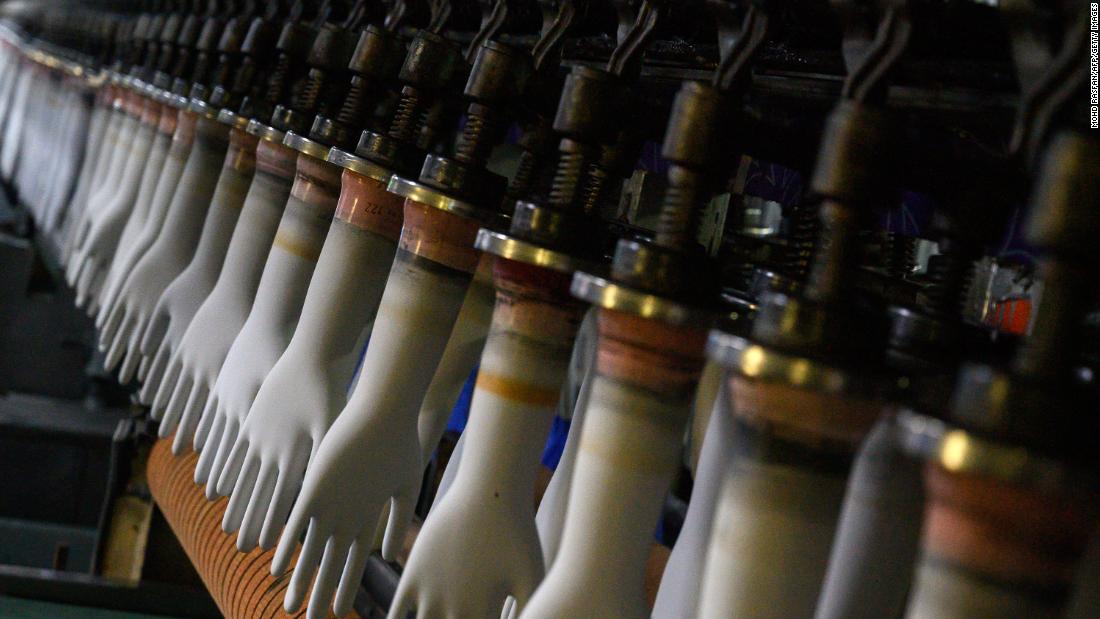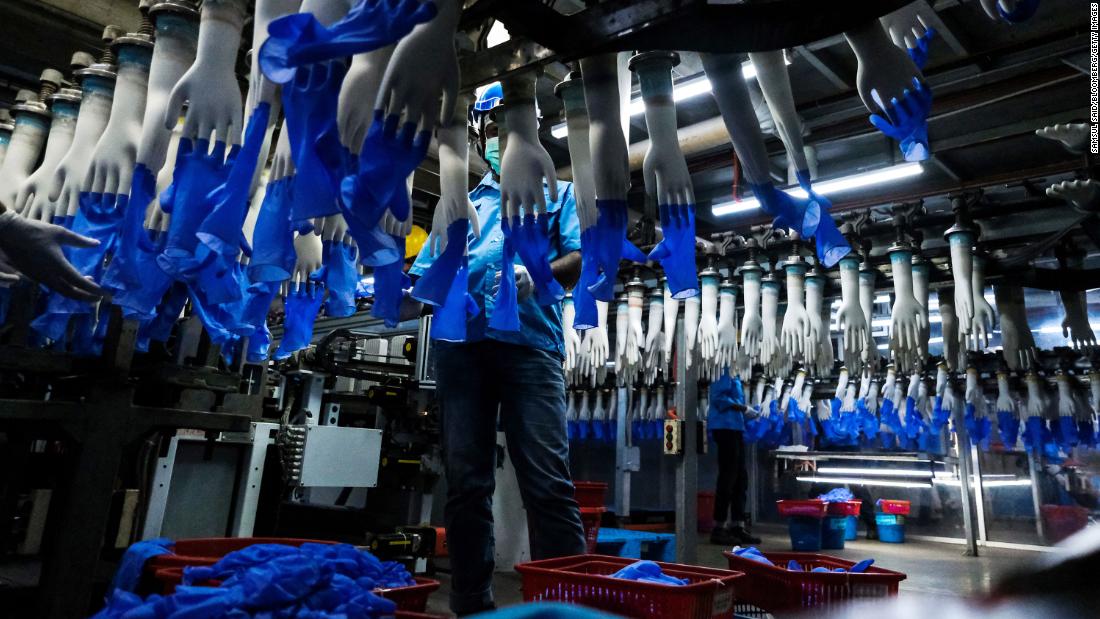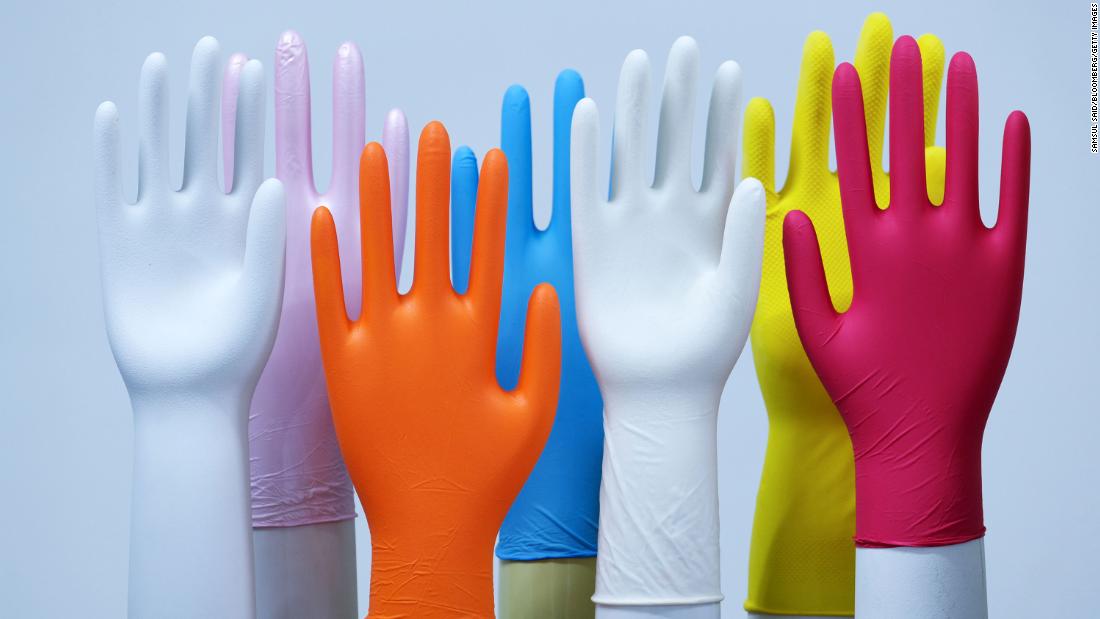CNN says "GLOVES are thriving because of the pandemic. Their workers aren't." Voice your opinion. Agree with CNN?
gloveharicut
Publish date: Sat, 12 Sep 2020, 09:03 AM
{{{PM me to join GLOVE Private Discussion Room}}}
I invite you to read my blog and make a smart GLOVE decision.
https://klse.i3investor.com/blogs/gloveharicut/blidx.jsp
I am reproducing the CNN article to my blog.
This post don't have any value added content.
Compile here for my own record.
Please skip if you don't like it.
https://edition.cnn.com/2020/09/11/business/malaysia-top-glove-forced-labor-dst-intl-hnk/index.html
The world's top suppliers of disposable gloves are thriving because of the pandemic. Their workers aren't
Updated 0024 GMT (0824 HKT) September 12, 2020
White molds wearing disposable gloves whizz by on a conveyor belt in a promotional video for the world's biggest glove maker, Top Glove.
World's glove factory
Foreign recruiters
Injuries and deaths
Supplies to the US
Industry attention
Related Stocks
| Chart | Stock Name | Last | Change | Volume |
|---|
Market Buzz
2024-07-22
HARTA2024-07-22
KOSSAN2024-07-22
KOSSAN2024-07-22
KOSSAN2024-07-22
KOSSAN2024-07-22
KOSSAN2024-07-22
KOSSAN2024-07-22
KOSSAN2024-07-22
KOSSAN2024-07-22
KOSSAN2024-07-22
TOPGLOV2024-07-22
TOPGLOV2024-07-19
KOSSAN2024-07-19
KOSSAN2024-07-19
KOSSAN2024-07-19
KOSSAN2024-07-19
KOSSAN2024-07-19
KOSSAN2024-07-19
KOSSAN2024-07-19
TOPGLOV2024-07-18
HARTA2024-07-18
HARTA2024-07-18
KOSSAN2024-07-18
KOSSAN2024-07-18
KOSSAN2024-07-18
KOSSAN2024-07-18
KOSSAN2024-07-18
KOSSAN2024-07-18
KOSSAN2024-07-18
KOSSAN2024-07-18
KOSSAN2024-07-18
KOSSAN2024-07-17
HARTA2024-07-17
HARTA2024-07-17
KOSSAN2024-07-17
KOSSAN2024-07-17
KOSSAN2024-07-17
KOSSAN2024-07-17
KOSSAN2024-07-17
KOSSAN2024-07-17
KOSSAN2024-07-17
KOSSAN2024-07-17
TOPGLOV2024-07-16
KOSSAN2024-07-16
KOSSAN2024-07-16
KOSSAN2024-07-16
KOSSAN2024-07-16
KOSSAN2024-07-16
KOSSAN2024-07-16
TOPGLOV2024-07-16
TOPGLOV2024-07-15
KOSSAN2024-07-15
KOSSAN2024-07-15
KOSSAN2024-07-15
KOSSAN2024-07-12
KOSSAN2024-07-12
KOSSAN2024-07-12
KOSSAN2024-07-12
KOSSAN2024-07-12
KOSSAN2024-07-12
KOSSAN2024-07-12
TOPGLOV2024-07-12
TOPGLOVMore articles on gloveharicut
Created by gloveharicut | Sep 20, 2022
Created by gloveharicut | Aug 30, 2021
Created by gloveharicut | May 04, 2021
Created by gloveharicut | Apr 19, 2021
Discussions
Prem from Macquarie was high on grass when he wrote that analysis.
I think it's on to forgive him IF he asks for it :)
2020-09-12 12:24
the workers recruitment fee is in fact made by agents (cronies of BN -zahid), just topglove and the rest could not say this out, the current government is under BN, now they have to bear these costs
2020-09-12 14:13
If the government is sincere they can deal with this problem easily.
Let the companies recruit themselves and the government issue paperwork through Labour Ministry. Wipe out politicians and middle man by hanging them by the balls.
It is not HARD OR DIFFICULT. It is simple.
But intentionally made difficult all due to GREED!
2020-09-12 14:17
What about us paying agents for domestic help? RM18k and if cabut? Agents collecting both sides who is to be blamed?
2020-09-12 14:27
"Posted by David Gunter > Sep 12, 2020 2:27 PM | Report Abuse
What about us paying agents for domestic help? RM18k and if cabut? Agents collecting both sides who is to be blamed?"
-------------------------------------------
Mostly Indonesian maids run away. It's a syndicate.
The same maid is send to different lazy idiots house.
Why? Because you are lazy and use work as an excuse to outsource homemaking. Your children are brought up by uneducated maids with zero parental love.
I have no sympathy for those who are cheated by maids and their syndicate.
2020-09-12 14:35
Posted by Tobby > Sep 12, 2020 2:33 PM | Report Abuse
Harapan had the chance to take down Zahid monopoly of bangla workers but they didn't!
==========================================
There were spoilers in Harapan government. The most important ministries are held by Malay ministers leaving out Welfare and Human Resource Ministry. They have no interest in foregoing lucrative income.
By right, Human Resource Ministry should be handling this labour matter but it functions as a dummy on a string. Home Ministry wields more power. The Moo (Betrayer from Bersatu) was the HM. He was busy plotting to end Harapan.
2020-09-12 14:41
cnn is a fake news and rubbish media. amazon is thriving and jeff bezos has $200 billions networth but none of his empuyee are thriving. how do they explain? cnn = cheap nonsense news
2020-09-12 19:06
no wonder Trump called CNN as fake news, a hoax, an useless fake media.
2020-09-12 23:47
When a company has an unusually high opportunity to earn super high income, I would like to hear from the company if they rewarded their lowest paid staff unusually higher than other normal companies. I have a problem understanding when these companies argue that the amount of wages being paid and facilities provided is standardised and within govt set standards while rewarding upper level staff and stock holders very well.
I hope to hear from these glove companies how they are rewarding lower paid workers unusually.
2020-09-13 00:06
Agreed. Even local engineer in tpglive oso not high paid. Not to mention foreign labors
2020-09-13 00:06
local chinese company ma.... tauke prosper, but low wages... sorry but this is hard truth
2020-09-13 00:15
I think the working condition is acceptable. Just build some more toilets.
2020-09-13 01:09
Apple has been.thriving until its market.cap is 2 trillion but the workers are not getting as rich as the shareholders. S hould CBP stop the shipments from going into US?
2020-09-13 07:57
@Tobby Posted by z3fthology > Sep 13, 2020 12:15 AM | Report Abuse
It isn't any different working for a 'white boss'. In fact, they are much better at exploiting workers.
Have you heard of the term the Working Homeless? Yeah.. you will find it in the US. People have a job but their pay is so low that they cannot afford to a place to live... not even a room. So they sleep in the subway, in the back of their car, or just an alley way. Homeless but fully employed... that is how you do real worker exploitation in the US.
Malaysian bosses in comparison don't know how to exploit their workers.
2020-09-13 10:12
Every minute late to work in topglove oso need to kira n deduct from ur salary. So calculative
2020-09-13 10:15
If no deduct salary for work, every one will also be late for work. These are factories workers, not doctors or lawyers who will keep and follow professional ettiquette. One late spared, all will follow. Unless you have better solutions for this as you too currently is a boss to many thousands of workers, I suggest best you shutup.
2020-09-13 10:49
China too has worst issues with labour forces poor living condition and cheap pay. Why isnt this Andy Hall has the guts to move to China to cover this kind of story? I dare him to go there, stronger cases better popularity for him. Yet he chose country like here to cover story so that his ass don't get burnt. Coward dog Andy Hall.
2020-09-13 10:57
BIG 4 AND OTHER GLOVE MAKERS HIRED AND FEEDING EASILY MORE THAN 50,000 EMPLOYEES AND THEIR FAMILIES IN MALAYSIA.
THESE FAMILIES THEIR KIDS RELY ON THE BIG 4.
MALAYSIA IS THE LARGEST GLOVE MAKER COUNTRY IN THE WORLD. THEY MAKE MALAYSIA VERY PROUD.
THEY HAVE BEEN CONTRIBUTING BIG TAX MONEY TO OUR COUNTRY.
WITHOUT GLOVE MAKERS BURSA CAN DA BAO CLOSED SHOP LIAO
What’s your HARMFUL contribution for bad mouthing Malaysia glove makers??
What’s your EVIL contribution for maligning Malaysia glove makers??
What’s your DESPICABLE contribution for helping fake news foreign media to defame Malaysia glove makers??
2020-09-13 11:33
agree
I think those Romans also fed millions of slaves, much much more than Gloves Companies.
without those Romans feeding those slaves, millions would have died.
I believe those slaves enjoyed being whipped when they did not row fast enough.
ha ha ha
2020-09-13 11:41
Do u want to work in a fompany that so calculative. Every month check your daily delay to work n sum out the total amount of delay to work n deduct ur salary?
2020-09-13 12:32
Topglove hr department must be very busy everyday clmonitor n calculatr the staff atendance
2020-09-13 12:34
" Posted by pBlue > Sep 13, 2020 10:12 AM | Report Abuse
...
Malaysian bosses in comparison don't know how to exploit their workers."
==========================
HAHAAHAHAHA!. That is the biggest joke i have ever heard.
Malaysia employers are the worse kind of blood suckers.
They demand their workers to work long hours and deduct their pay for petty things. In some cases workers are forced to work 24 hours plus the next day normal 12 hours.
They are tied down to mind boggling conditions which trnaslate them to be slaves. They are forced to work on unrelated work to their position, citing PROACTIVE and "WORK-IN-TEAM" nonsense.
End of the day they get paid pittance.
The white bosses pay handsomely manifold and they obey labour law. Some fill up white man's MNC companies due to these benefits, yet they spit on them. ungrateful bastards.
Malaysian employers and the authorities are in cahoot and exploit workers. That is the untold truth.
2020-09-13 13:38
They wotk with white man to steal the product idea.
Intellectual property theft.
That is why you find many duplicate or counterfeit product manufacturers.
They are proud of being counterfeit manufacturers and shamelessly claim as being smart.
2020-09-13 17:21
smart or not ? millions of people worship counterfeit sellers
coz Head of Counterfeit of Sellers worth few Billion USD
Head of Counterfeit Sellers travel around the world to give free seminars and arrange free gloves deliveries.
2020-09-13 17:46
counterfeits are biggest USD earners for China coz more than 33% of counterfeit online turnover comes from US market.
Whole world worship Head of Counterfeit Sellers as God.
Even Malaysian Govt. invites Counterfeit God to come.
2020-09-13 17:52
LOL!! Abibas...
Good one!
Abibas for RM30, buy 1 2 free!
No warranty, use only once and throw.
2020-09-13 18:03
"Bad because it's a IP theft no matter how you justify it!"
==========================================================
They have no shame or integrity to earn money in dubious ways.
That is you find them promoting gambling dens, running casinos, prostitution centers, pimping, loan sharking, thug activities. They expand their wings to all under developed countries and create underworld links. Example Cambodia, Pakistan, Vietnam, Africa and South America.
They would not even blink an eye to sell their mother or daughter for money. No wonder pig is this main food cause it is greedy.
The greedy nature of a pig is in their blood.
2020-09-13 18:09
The irony is that, they do and earn from illegal activities but talks about integrity, honesty, responsibility.
LOL!!!
2020-09-13 18:12
Each company in Malaysia is the same la.. they treat Bangladesh , nepalise like that.. Chinese do business is like that , if not treat them like that they will leave Malaysia
2020-09-13 19:39
@dicky, please refer to topglove share price over 10 years.when did it stopped going up? sour prick
2020-09-13 20:22
"Posted by JXnotJAX > Sep 13, 2020 8:22 PM | Report Abuse
@dicky, please refer to topglove share price over 10 years.when did it stopped going up? sour prick"
===============================================
Glad that you have tasted that prick! :-p
2020-09-13 20:23
I agreed with CNN. Chinaman vs Bangla. Sure towkay Chinaman wins. Hey, you all want to work? Here 1 sen for you...I get 99 sen.
2020-09-14 01:47
A company setup in a 3rd world country, run by Chinaman, what do you expect? Even local colleges are run in more or less the same way, "Squeeze the staff and workers, kaw kaw". Money is KING, I guess. The history has shown how the Chinese business culture has made the rich tycoons.
2020-09-14 10:15
If local not happy with the employer (any employer, not just the BIG 4) then just dont work for them lah.
Some say why company nakenso much money but employee not rewarded? Firstly, they are employee who agreed to work with the agreed salary. Secondly, if company lose money, will employee help to pay for the loses?
2020-09-16 14:14

























DickyMe
Fully support CNN's view. Glove stocks rise is due to pandemic, other than that it is just another toilet paper.
2020-09-12 11:41